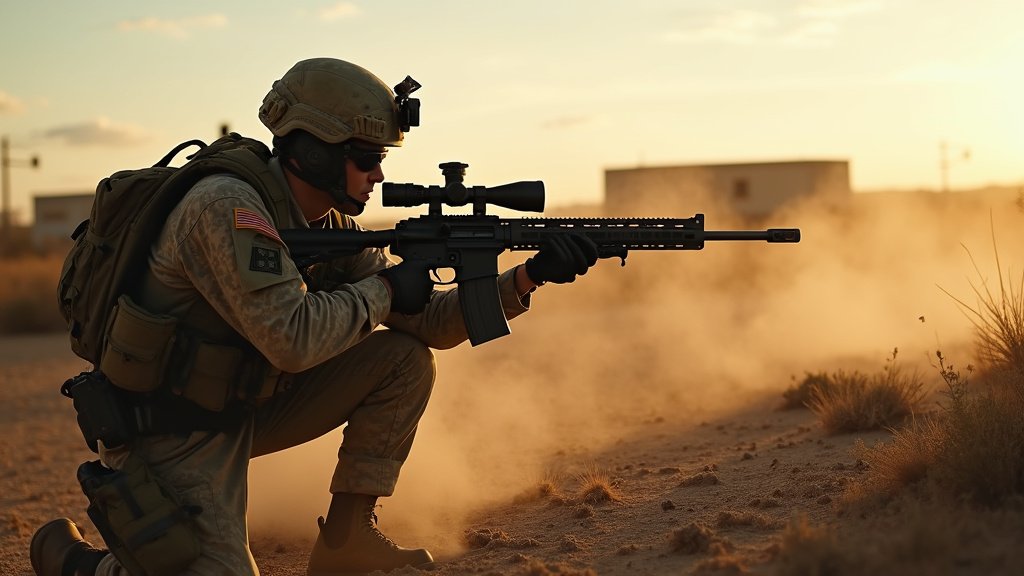In a significant move to elevate its precision marksmanship and tactical prowess, the Oregon National Guard recently hosted its inaugural Oregon State Sniper Qualifier. This landmark event, held from September 4-6 at the Boardman Training Area, specifically the Raymond Rees National Guard Training Center, marked a historic first for the state, aiming to benchmark and enhance the capabilities of its elite sniper teams to national standards.
Establishing a New Standard for Marksmanship
The three-day competition was meticulously designed to push participants beyond conventional military range training. Instead of solely focusing on marksmanship accuracy, the Oregon State Sniper Qualifier challenged sniper teams with complex, multi-stage scenarios that closely mimic the demanding realities of real-world operations. Sgt. 1st Class Andrew Graham, section sergeant and course manager for the 11B Military Occupational Specialty Qualification and Infantry Training Course at the 249th Regional Training Institute (RTI), explained the core objective: “What we’re trying to accomplish out here is really for the Oregon sniper teams around the state,” he stated. “We’re trying to create a competition and a program of training that prepares them for competition at higher levels.” This sentiment underscores the initiative’s ambition to foster a program that not only identifies top talent within Oregon but also cultivates a higher echelon of readiness applicable to national and international competitive arenas.
The competition itself featured nine distinct stages, encompassing precision rifle engagements, intricate movement scenarios, and culminating events engineered to test every facet of a sniper team’s expertise. These challenges were deliberately crafted to demand more than just expert shooting. As Graham elaborated, “It’s more than just shooting expert. It’s thinking outside the box. It’s problem-solving. It’s working with limited information, making timely and correct decisions.” The demanding nature of the event was further illustrated by specific stages requiring teams to complete grueling sequences within unforgiving time limits, such as an 18-minute window for a complex series of tasks.
A Stepping Stone to National Recognition
The stakes for the Oregon State Sniper Qualifier were considerable. The winning team earned the coveted opportunity to represent Oregon at the prestigious Winston P. Wilson Sniper competition, a highly regarded event that serves as a critical stepping stone towards potential participation in the International Sniper Competition. This pathway highlights the strategic importance placed on these state-level competitions as vital pipelines for developing and showcasing top-tier military marksmen.
Oregon’s involvement in higher-level competitions is not new. Teams from the Oregon Army National Guard, such as Staff Sgt. Coertlandt Bauer and Sgt. Dakota Hodges of the 3rd Battalion, 116th Cavalry Brigade Combat Team, have previously represented the state at national championships like the Winston P. Wilson and Armed Forces Skill at Arms Meeting (AFSAM) Sniper Championships. These events, held at locations like Fort Chaffee, Arkansas, pit elite units from across U.S. military branches and international forces against one another. Competitors there face challenging daylight and nighttime scenarios, utilizing advanced equipment including the Mark 22 Advanced Sniper Rifle and sophisticated night vision devices to engage targets at extreme ranges. These experiences underscore the competitive landscape that the Oregon State Sniper Qualifier aims to prepare teams for, pushing them to adapt to new technologies, tactics, and the immense pressure inherent in high-stakes engagements.
Broader Implications for Readiness and Strategy
The establishment of the Oregon State Sniper Qualifier is more than just a competitive endeavor; it aligns with the broader strategic objectives of the Oregon National Guard. The organization emphasizes maintaining high levels of readiness, adapting its force for future challenges, and leveraging dual-use capabilities. Sniper teams, by their nature, are considered critical “asymmetric tools for commanders.” Their roles extend beyond direct engagement to encompass vital intelligence gathering, reconnaissance, surveillance, and the precise neutralization of high-value targets, all while operating from concealed positions. The training inherent in these competitions directly enhances a commander’s ability to deploy highly skilled, adaptable units capable of operating effectively with limited information and under intense time constraints—skills that are increasingly valuable in modern, complex operational environments.
Sgt. 1st Class Robert Gillam, who played a key role in the event’s planning and execution, noted the compressed timeline for its creation, highlighting the determination and resourcefulness of the organizers. With approval secured following the successful Adjutant General’s match earlier in the year, the event was planned and executed in just three months. This rapid development speaks to the immediate need and enthusiasm for such specialized training within the Oregon Guard.
Cultivating Future Talent and Innovation
Looking ahead, organizers have already begun planning for the 2026 competition, with ambitions to secure additional training areas at Boardman and expand the event’s scope. The goal is to solidify the Oregon State Sniper Qualifier as a permanent annual program. This sustained effort aims not only to identify Oregon’s premier sniper teams but also to elevate the overall standard of precision marksmanship training across the region. The success and innovative approach of the inaugural event have already garnered significant interest. Reports indicate that Special Forces units, teams from neighboring states, and various law enforcement agencies have expressed a keen desire to participate in future iterations, signaling the event’s growing reputation and strategic value.
Furthermore, the competition has embraced technological innovation. The use of the Impact Scoring mobile application, commonly seen in civilian precision shooting events, streamlined competitor management, document distribution, and score calculation, demonstrating a forward-thinking approach to event execution. The expertise of the cadre, many of whom are Bravo 4 sniper-qualified and experienced national competitors, ensures that participants receive training that is directly transferable to higher-level challenges.
In conclusion, the inaugural Oregon State Sniper Qualifier represents a crucial advancement in the Oregon National Guard’s commitment to excellence in specialized warfare. By fostering a competitive environment that emphasizes strategic thinking, adaptability, and peak marksmanship, this event is not merely a contest but a vital component in developing highly capable military assets ready to meet evolving national security demands and contribute to the broader evolution of sniper tactics and training nationwide. This news from Oregon highlights the ongoing dedication to maintaining a sharp, ready force.




